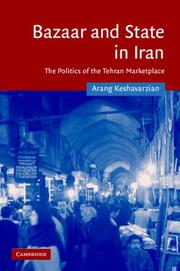| Listing 1 - 4 of 4 |
Sort by
|
Book
ISBN: 1108806856 1108762530 1108801129 1108486789 Year: 2020 Publisher: Cambridge : Cambridge University Press,
Abstract | Keywords | Export | Availability | Bookmark
 Loading...
Loading...Choose an application
- Reference Manager
- EndNote
- RefWorks (Direct export to RefWorks)
To people operating in India's economy, actually existing markets are remarkably different from how planners and academics conceive them. From the outside, they appear as demarcated arenas of exchange bound by state-imposed rules. As historical and social realities, however, markets are dynamic, adaptative, and ambiguous spaces. This book delves into this intricate context, exploring Indian markets through the competition and collaboration of those who frame and participate in markets. Anchored in vivid case studies - from colonial property and advertising milieus to today's bazaar and criminal economies - this volume underlines the friction and interdependence between commerce, society, and state. Contributors from history, anthropology, political economy, and development studies synthesize existing scholarly approaches, add new perspectives on Indian capitalism's evolution, and reveal the transactional specificities that underlie the real-world functioning of markets.
Informal sector (Economics) --- Bazaars (Markets) --- Markets --- Bazaars, Oriental --- Bazars (Markets) --- Oriental bazaars --- Souks --- Fairs --- Public markets --- Commerce --- Market towns --- India --- Economic conditions.
Book
ISBN: 1501709747 9781501712388 1501712381 9781501709746 9781501709326 1501709321 Year: 2017 Publisher: Ithaca, NY : Cornell University Press,
Abstract | Keywords | Export | Availability | Bookmark
 Loading...
Loading...Choose an application
- Reference Manager
- EndNote
- RefWorks (Direct export to RefWorks)
Order at the Bazaar delves into the role of bazaars in the political economy and development of Central Asia. Bazaars are the economic bedrock for many throughout the region-they are the entrepreneurial hubs of Central Asia. However, they are often regarded as mafia-governed environments that are largely populated by the dispossessed. By immersing herself in the bazaars of Kyrgyzstan, Regine A. Spector learned that some are rather best characterized as islands of order in a chaotic national context. Spector draws on interviews, archival sources, and participant observation to show how traders, landowners, and municipal officials create order in the absence of a coherent government apparatus and bureaucratic state. Merchants have adapted Soviet institutions, including trade unions, and pre-Soviet practices, such as using village elders as the arbiters of disputes, to the urban bazaar by building and asserting their own authority. Spector's findings have relevance beyond the bazaars and borders of one small country; they teach us how economic development operates when the rule of law is weak.
Post-communism --- Bazaars (Markets) --- Postcommunism --- World politics --- Communism --- Bazaars, Oriental --- Bazars (Markets) --- Oriental bazaars --- Souks --- Fairs --- Markets --- Economic aspects --- Bishkek (Kyrgyzstan) --- Pishpek (Kyrgyzstan) --- Бишкек (Kyrgyzstan) --- Frunze (Kirghiz S.S.R.) --- Commerce.
Book
ISBN: 9780521855327 0521855322 Year: 2008 Volume: *90 Publisher: Cambridge: Cambridge university press,
Abstract | Keywords | Export | Availability | Bookmark
 Loading...
Loading...Choose an application
- Reference Manager
- EndNote
- RefWorks (Direct export to RefWorks)
Bazaars (Markets) --- Markets --- Bazars orientaux --- Marchés --- Rome --- Commerce --- Economic conditions --- Conditions économiques --- History --- History. --- Economic conditions. --- Rome (Italy) --- Marchés --- Conditions économiques --- Bazaars, Oriental --- Bazars (Markets) --- Oriental bazaars --- Souks --- Fairs --- Rome (Italy : Commune) --- Rome (Italy : Governatorato) --- Rūmah (Italy) --- Roma (Italy) --- Rom (Italy) --- Rím (Italy) --- Rzym (Italy) --- Comune di Roma (Italy) --- Rome (Italy : Comune) --- Bazaars (Markets) - Rome - History --- Rome - Commerce - History --- Rome - Economic conditions --- Commerce.

ISBN: 9780521103305 9780521866187 9780511492228 0511278586 9780511278587 9780511279188 0511279183 9786610850419 6610850410 0521866189 0511277415 9780511277412 0511278004 9780511278006 1107170249 1280850418 0511492227 0511321511 0521103304 Year: 2007 Publisher: Cambridge : Cambridge University Press,
Abstract | Keywords | Export | Availability | Bookmark
 Loading...
Loading...Choose an application
- Reference Manager
- EndNote
- RefWorks (Direct export to RefWorks)
The Tehran Bazaar has always been central to the Iranian economy and indeed, to the Iranian urban experience. Arang Keshavarzian's fascinating book compares the economics and politics of the marketplace under the Pahlavis, who sought to undermine it in the drive for modernisation and under the subsequent revolutionary regime, which came to power with a mandate to preserve the bazaar as an 'Islamic' institution. The outcomes of their respective policies were completely at odds with their intentions. Despite the Shah's hostile approach, the bazaar flourished under his rule and maintained its organisational autonomy to such an extent that it played an integral role in the Islamic revolution. Conversely, the Islamic Republic implemented policies that unwittingly transformed the ways in which the bazaar operated, thus undermining its capacity for political mobilisation. Arang Keshavarizian's book affords unusual insights into the politics, economics and society of Iran across four decades.
History of Asia --- anno 1900-1999 --- Tehran --- Bazaars (Markets) --- Bazaars, Oriental --- Bazars (Markets) --- Oriental bazaars --- Souks --- Fairs --- Markets --- Iran --- República Islâmica do Irã --- Irã --- Persia --- Northern Tier --- Islamic Republic of Iran --- Jumhūrī-i Islāmī-i Īrān --- I-lang --- Paras-Iran --- Paras --- Persia-Iran --- I.R.A. --- Islamische Republik Iran --- Islamskai︠a︡ Respublika Iran --- I.R.I. --- IRI --- ايران --- جمهورى اسلامى ايران --- Êran --- Komarî Îslamî Êran --- Economic conditions --- Social conditions --- Politics and government --- Social Sciences --- Political Science
| Listing 1 - 4 of 4 |
Sort by
|

 Search
Search Feedback
Feedback About UniCat
About UniCat  Help
Help News
News